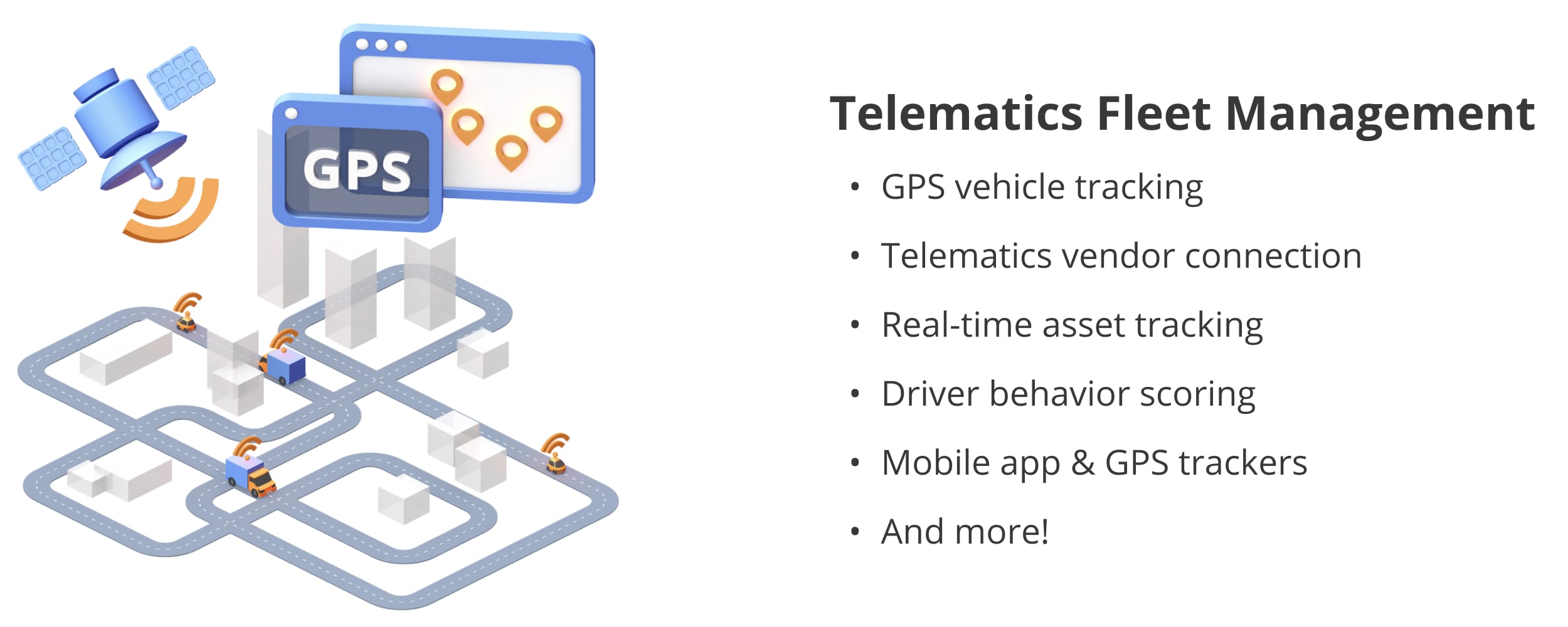What Is Fleet Management in 2024? Stats, Trends And Software
In the rapidly-changing logistics environment, unprecedented spikes in demand for last mile delivery, as well as ever-evolving customer expectations, fleet managers are struggling to keep their fleets efficient and environmentally friendly. Consequently, today’s logistics intense businesses look for constant optimization opportunities. Specifically, how to optimize fleet management, maximize fleet asset utilization, improve supply chain management, streamline route planning, etc.
On that note, this article aims to be a complete guide on what vehicle management means, fleet administration best practices, and how to optimize fleet management functions using technologies such as vehicle telematics, fuel management tools, fleet performance analytics, driver management software, and more.
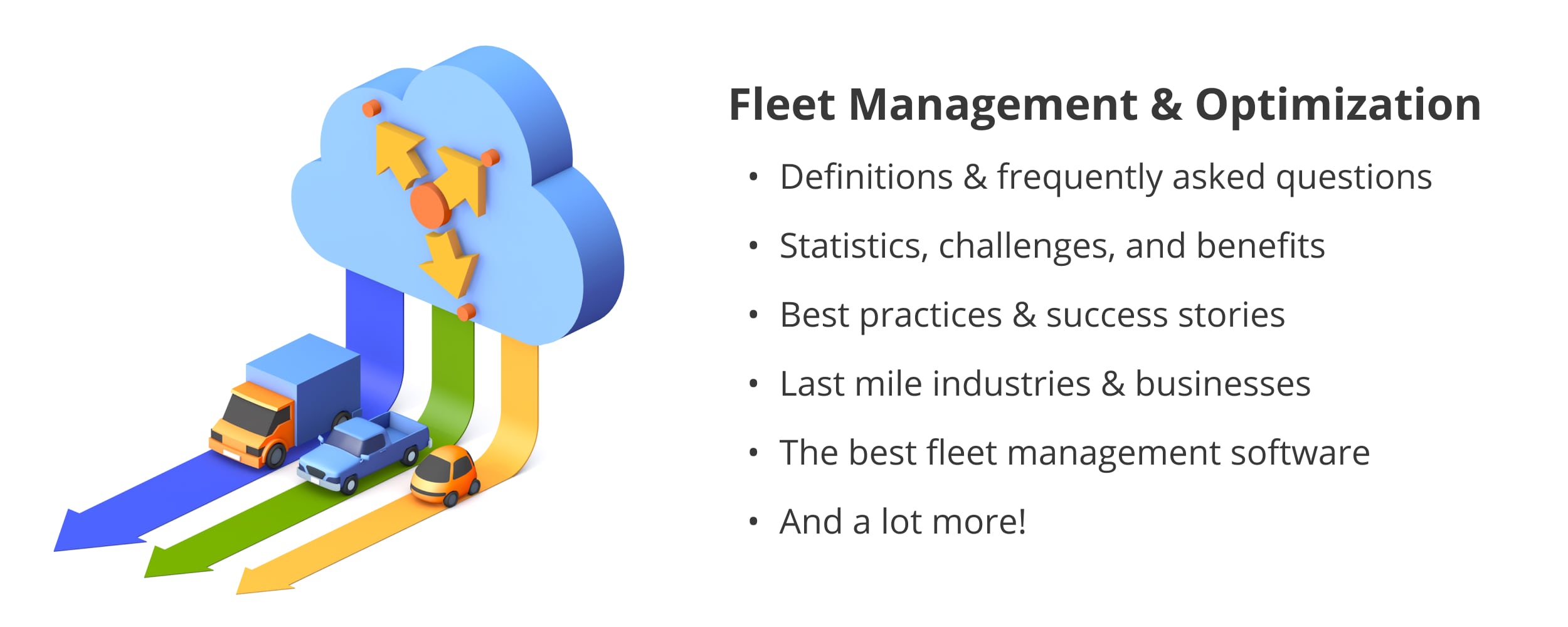
Table of Contents
Fleet Management Definition – What Is Fleet Administration?
So, what is fleet management?
Fleet management or fleet administration is a logistics function that enables transportation businesses to ensure optimal utilization of fleet assets. Moreover, the fleet management meaning entails multiple risk-reduction, productivity-boosting, compliance, and cost-cutting strategies.
Furthermore, fleet administration is not always a synonym for vehicle management. On the contrary, the fleet management definition can also refer to airline fleet optimization, naval fleet administration for ships and vessels, drone and unmanned aerial vehicle management, etc.
However, in this article, you will find information only about fleet management for cars, autonomous vehicles, trucks, vans, and other types of commercial motor vehicles, the meaning of fleet administration for vehicle-reliant logistics businesses, and the most sought-after fleet management platforms.
Keep reading to learn about what fleet vehicle management means in logistics.
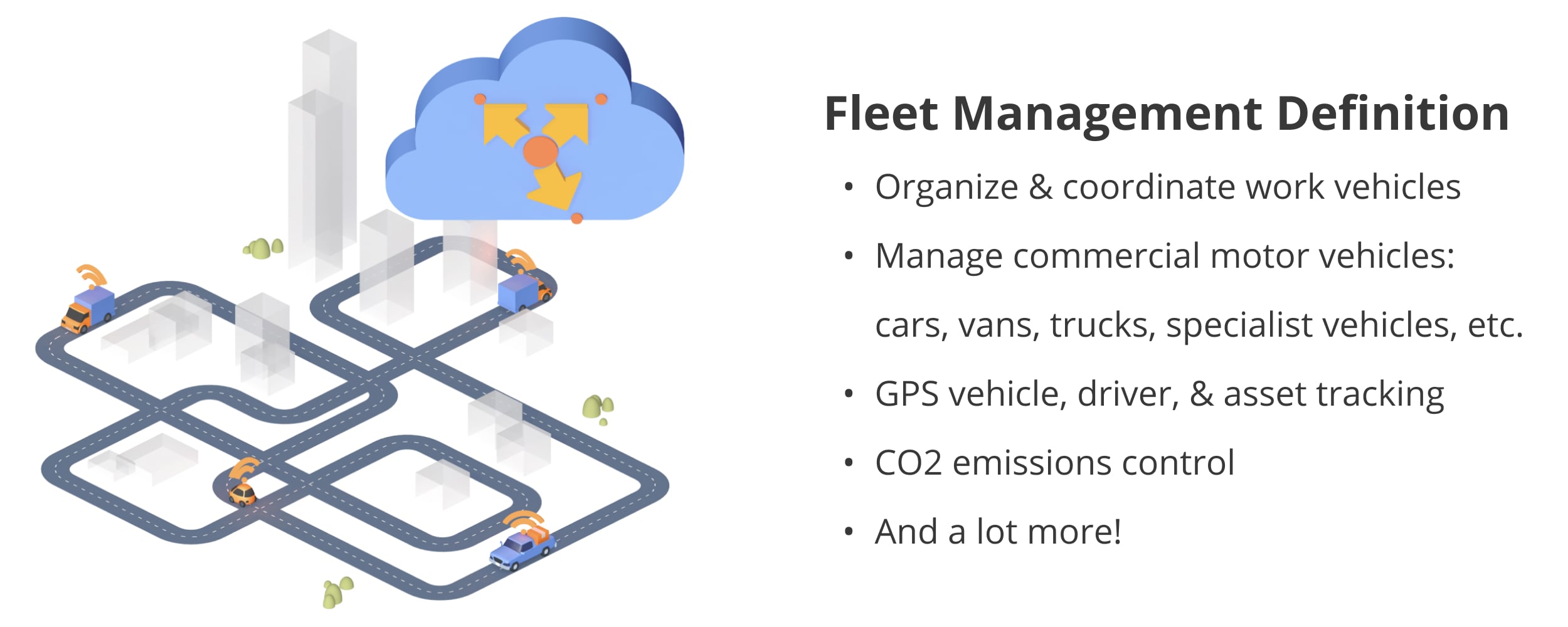
Fleet Management Statistics
Why should you consider using fleet software? According to a G2 article, these are some of the benefits experienced by logistics professionals after using vehicle management technology:
- Over 40% of logistics managers reported a decrease in driver safety incidents since starting to use fleet vehicle tracking systems.
- More than 50% of businesses have registered an improvement in customer service.
- 55% of fleets managed to decrease fuel consumption.
- Idling is more expensive than using technology like fleet vehicle management software to reduce idling. And these idling expenses are not just fuel-related. Namely, idling also increases engine wear. This translates into additional vehicle maintenance costs.
Additionally, to learn more about how vehicle management solutions can help you minimize fleet expenses while increasing profits, read How fleet optimization software helps you expand with minimal costs.
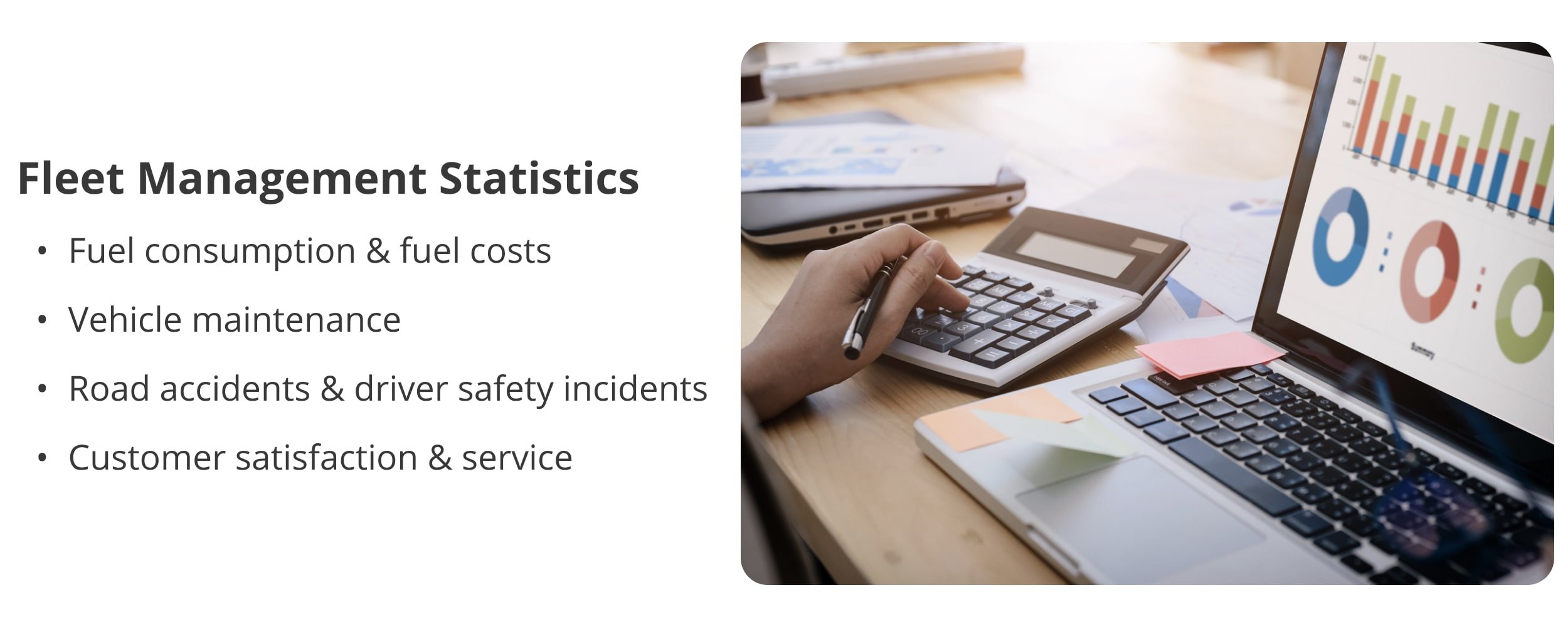
Businesses and Industries Using Fleet Management
But does your business need fleet vehicle management optimization? If your fleet consists of at least 5 or more vehicles, you can leverage significant fleet efficiencies by using vehicle management technology. Similarly, the same goes for any logistics intense business that relies on local delivery, distribution, field service, etc. and activates in industries such as:
- Alarm and security
- Auto parts/repair
- Beauty supply
- Beverage machine refills
- Municipal government
- Dog grooming
- Snow removal
- Waste collection
- Window cleaning
- Flower delivery
- Couriers and last mile carriers
- Field service technicians
- And a lot more!
Thus, you’re likely to improve your operation with a capable fleet management system if you have a field-oriented business. But what exactly are the benefits of using this fleet optimization technology?
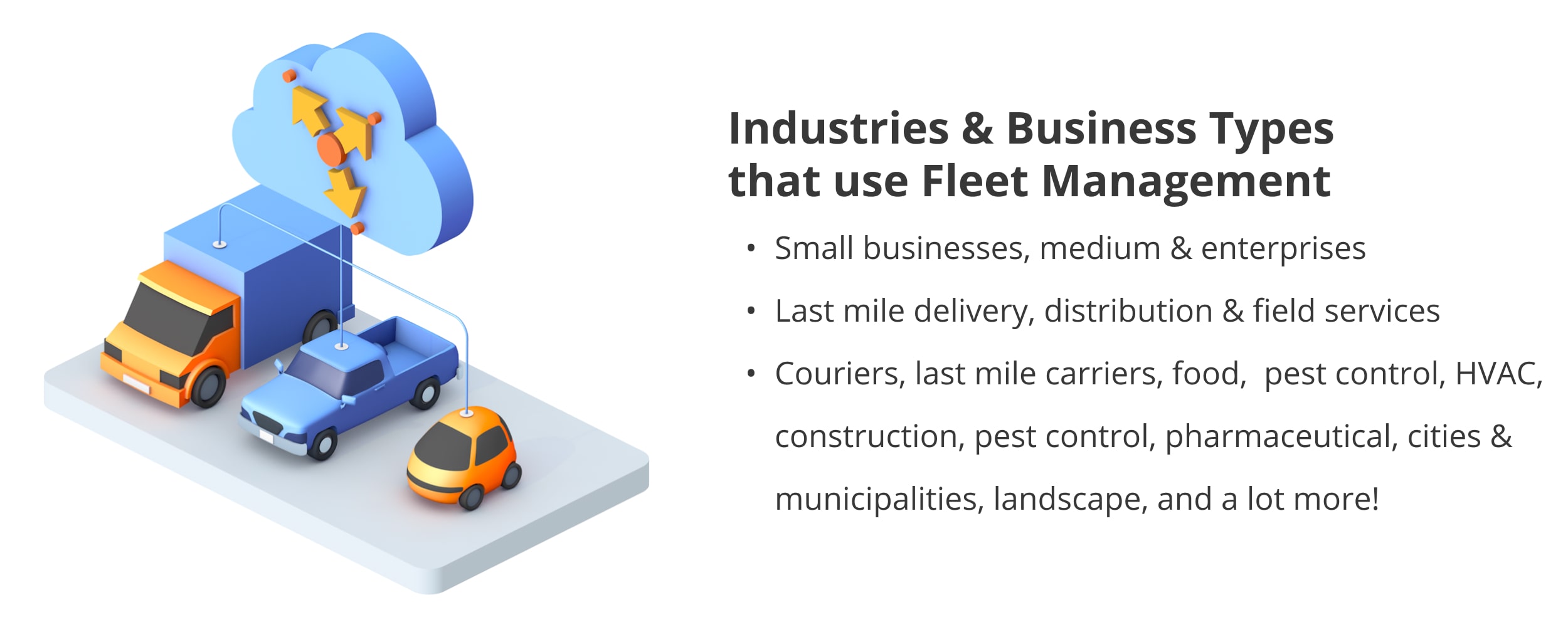
Fleet Management Benefits
Concisely, fleet management and maintenance software helps logistics managers track fleet resources, optimize processes, and increase productivity and profitability. Aside from making managers’ jobs easier, fleet optimization solutions also help field service and logistics professionals to:
- Stay compliant with road vehicle restrictions and legislation
- Supervise the life-cycle of vehicles and reduce maintenance expenses
- Ensure that drivers don’t fall behind schedule – and if they do, find out why
- Optimize the last mile and create the fastest and most cost-efficient routes
- Track vehicles in near real-time and improve collaboration with field employees
- Reduce road accident risks and fleet insurance costs
- Prevent driver fraud and unauthorized use of fleet resources
- Improve the behavior of drivers while on the road and increase driver retention
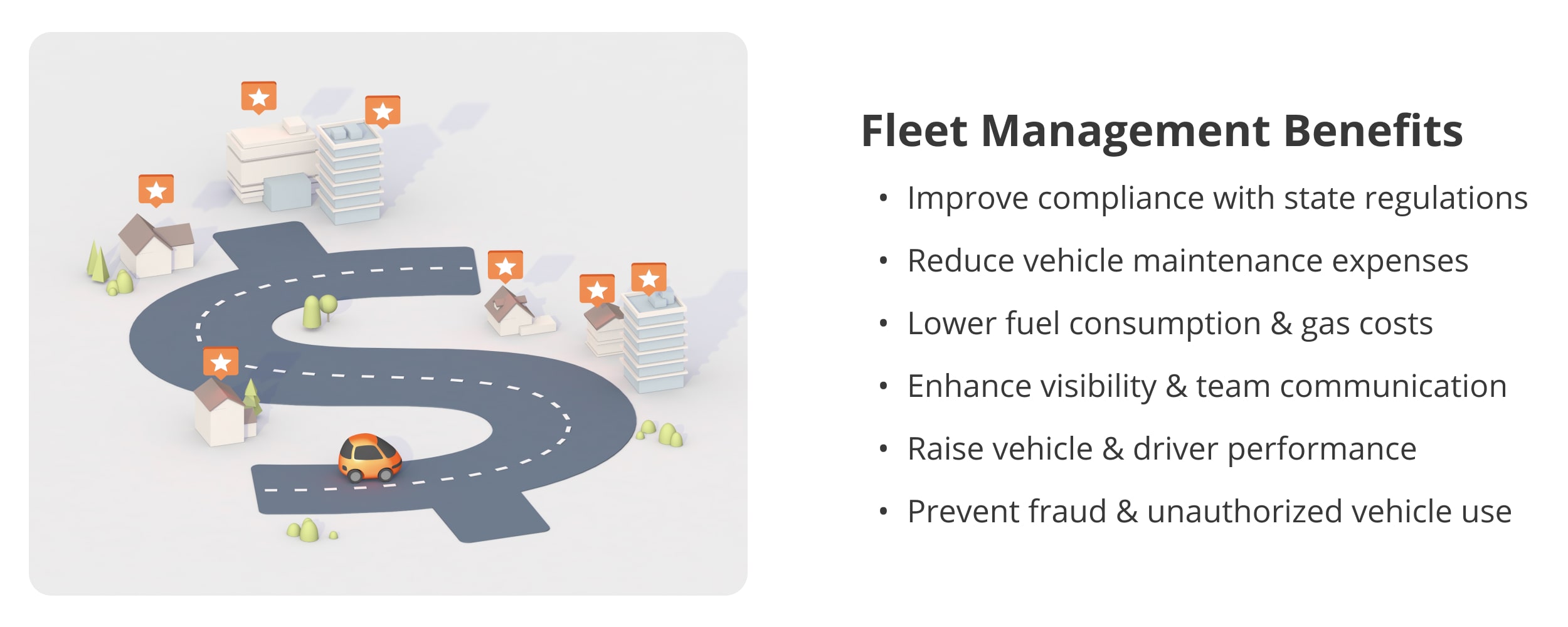
Fleet Management Frequently Asked Questions
To help you gain a deeper understanding of what fleet optimization can really do for your business, you can read the FAQs below. In detail, Route4Me’s fleet management experts have gone through decades worth of customer questions, selected, and then answered the most frequently asked questions about vehicle management and fleet optimization.
By reading these fleet management FAQs, you’ll learn about what fleet administration is, the purpose of vehicle management, why fleet optimization is important, what a gray fleet is, what are the main fleet manager responsibilities, and a lot more.
After learning everything about how you can optimize your fleet and logistics processes, as well as the benefits that you can leverage by doing so, you’ll be ready to choose the best fleet management shipping software for your logistics intense business. Read on and ensure you’re making an informed purchase decision.
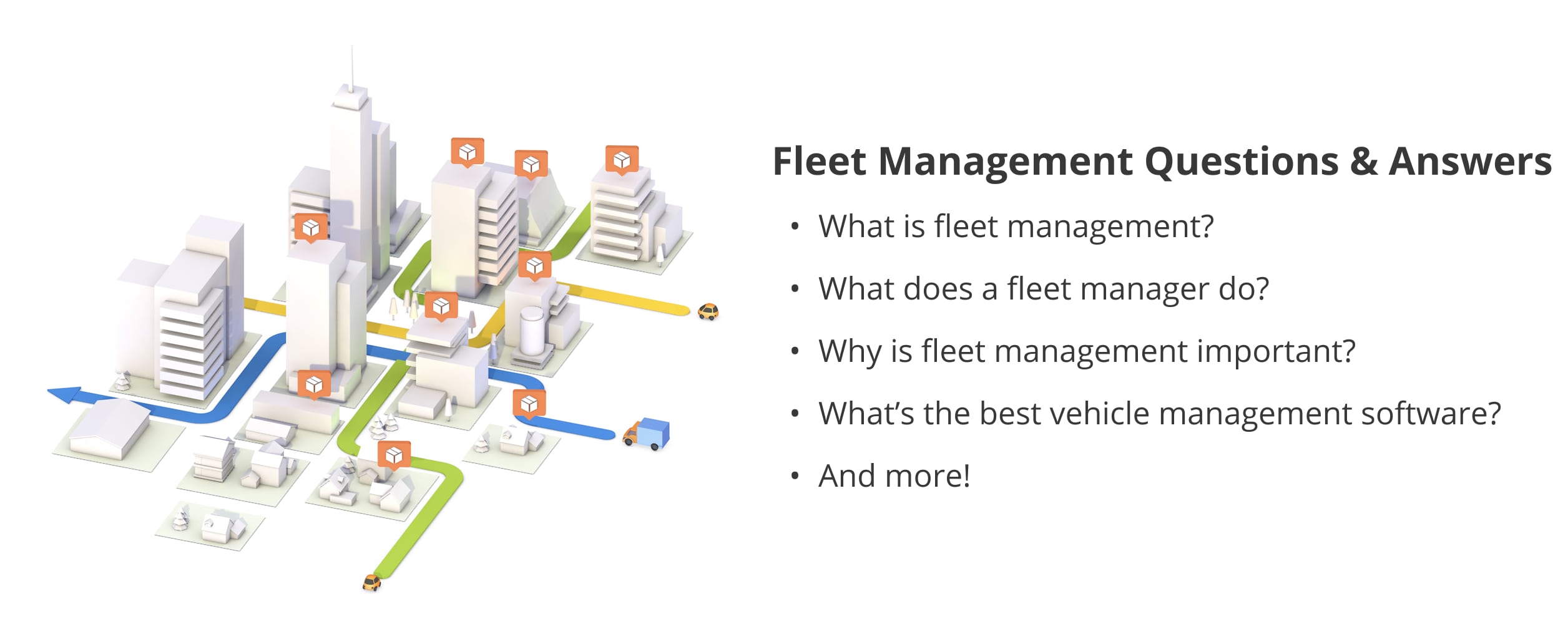
Fleet management is a collection of logistics processes and functions that aim to reduce fleet costs and improve the profitability of a fleet. Additionally, fleet management can also be referred to as fleet administration.
Furthermore, the fleet management definition entails multiple fleet and logistics operations that can reduce a fleet’s operational and maintenance costs, protect fleet assets, minimize a fleet’s carbon emissions, as well as optimize the utilization of fleet capacity. Particularly, such processes and functions include but are not limited to:
- Vehicle GPS tracking and fleet management telematics: Prevents vehicle theft and unauthorized vehicle usage.
- Fuel management, fuel consumption, and fuel cost analysis: Helps you avoid fuel card fraud.
- Fleet management tracking: Enables logistics managers to check field employees’ driving history and identify unapproved route detours and risky driver behavior.
- Route planning and route optimization: Reduce mileage, fuel consumption, route duration, vehicle wear and tear, and more. Learn more about the benefits of enterprise truck routing software and route optimization by reading our Route Planning 2024: Trends, Challenges, and Best Software and Route Optimization 2024: Trends, Challenges, Best Software articles.
Fleet management in logistics is the process of supervising, optimizing, and administering a group of motor vehicles forming a fleet owned or leased by a business, government agency, or other organization. For example, fleet management vehicles can include private cars used for business purposes (gray fleet), vans, trucks, excavators, forklifts, trailers, etc.
Furthermore, vehicle management is a complex discipline that encompasses multiple logistics activities. Thus, logistics managers prefer using fleet administration software to keep everything under control using a single fleet management dashboard. For instance, with Route4Me’s easiest route optimizer, logistics professionals can:
- Create detailed vehicle profiles for each fleet vehicle
- Plan optimized routes as per vehicles’ loading and carrying capacity, business rules, and customer constraints
- Monitor fuel consumption, routing metrics, and fleet management KPIs
- Track drivers in near real time on an interactive map
- Integrate Route4Me with virtually any telematics provider
- And a lot more!
Keep reading to learn more about how Route4Me can help you streamline your fleet vehicle management activities.
Gray fleet management refers to organizing and supervising multiple vehicles owned by employees and used for business purposes. Moreover, gray fleet administration encompasses the same processes as regular fleet management, the only difference between the two being the owner of the vehicle.
Respectively, regular fleet administration entails supervising a fleet of vehicles owned or leased by a business. By contrast, gray fleet vehicle management involves managing employees’ personal vehicles that are used for work.
Regardless of your fleet’s nature, Route4Me can help you cut fuel costs and reduce mileage while automating all of your repetitive fleet processes. Keep browsing this article to discover how Route4Me can improve fleet profitability while promoting fleet safety, lowering your business’s carbon footprint, and enabling growth.
Enterprise fleet management entails the administration of medium-sized to large fleets of more than 20 vehicles. Moreover, enterprise fleet administration requires more planning than fleet management for small businesses. Specifically, as the number of motor vehicles to be managed increases, so does the difficulty of keeping track of vehicle availability, preventive maintenance, service appointments, fuel consumption, vehicle GPS location, etc.
However, when using route planning and vehicle management software such as Route4Me, your fleet’s growth will not mean more work for managers. Namely, with Route4Me, you can automate route planning, vehicle scheduling, route dispatch, etc., with just a click of a button. This makes vehicle management easy regardless of the size of your fleet.
Fleet management is important because it helps last-mile businesses ensure minimal operational costs and maximum fleet productivity. Moreover, vehicle management can directly impact the bottom line of a logistics intense business. For example, here are a couple of downsides of not optimizing your fleet:
- Not scheduling periodic service visits → Increased vehicle maintenance costs.
- Vehicles navigating unoptimized routes → Rising fuel consumption as well as fuel expenses.
- Not tracking drivers and vehicles → Unnecessary driver idling, late deliveries, unauthorized use of company property, etc.
In short, efficient fleet administration helps businesses reduce expenses while supporting business growth. Read further to learn how you can improve vehicle management using the right technology for your unique fleet needs.
The purpose of fleet management is to ensure optimal fleet capacity utilization, improve fleet efficiency and fleet productivity while promoting driver safety as well as expanding the fleet vehicle lifespan. For these fleet management objectives to be achieved, managers need to simultaneously leverage vehicle maintenance management, driver and vehicle tracking, fleet reporting and analytics, and more similar logistics and supply chain processes and functions.
To make things less complicated and simplify the jobs of fleet managers, Route4Me features multiple fleet administration tools that help businesses to keep their fleet orchestration costs as low as possible while keeping customers satisfied and loyal.
A fleet manager is responsible for overseeing all the processes related to a fleet’s functioning and performance. Specifically, fleet managers’ responsibilities can include monitoring the following processes:
- Vehicles’ maintenance schedules
- GPS tracking for vehicles and drivers
- Compliance with local carbon dioxide (CO2) emissions regulations
- Driver management and orchestrating a fleet management organizational structure
- Route planning
- Fleet maintenance management
- Driver health and safety management
- And more!
Even though it sounds like a lot of work, fleet administrators can fulfill their responsibilities easier with vehicle management software. For example, Route4Me’s route optimization software enables fleet managers to monitor their entire fleets and the adjacent processes on a single interface.
To improve fleet management, you should leverage or optimize the following logistics functions:
- Real time fleet asset tracking
- Route scheduling, route planning, and route optimization
- Timely service appointments and vehicle preventive maintenance
- Turn by turn navigation for regular vehicles and route navigation for trucks
- Driver safety compliance – i.e., the hours of service rule (HOS)
- And much more!
Keep reading to learn more about the best practices for fleet managers and how Route4Me’s fleet optimization software can help you achieve maximum fleet efficiency.
Fleet management software is a computer program that features tools for vehicle tracking, driver management, logistics analytics and reporting, route planning, route optimization, etc. Furthermore, fleet optimization software provides logistics intense businesses the necessary technology for reducing fleet-related expenses while ensuring optimal vehicle load capacity utilization.
For example, Route4Me’s fleet route planning software offers users the ability to:
- Optimize routes for mixed fleets and uniform fleets
- Plan routes that factor in routing constraints such as time windows, order priority, pieces, revenue, etc.
- Automate vehicle dispatch and route scheduling for repetitive routes
- Dynamically implement route changes across your organization’s account
- Use Route4Me’s Android Route Planner and iOS Route Planner apps for drivers with in-app navigation
- Assign custom vehicle statuses to account for vehicle availability
- Pair Route4Me with your favorite telematics solution
- And much more!
To learn more about Route4Me’s fleet optimization software capabilities, read our Getting to Know the Basics – Route4Me Route Planning Software article.
The best fleet management software should offer multiple capabilities and features to satisfy a business’s unique logistics needs. In detail, the best fleet management software for small fleets might not be the best choice for enterprises with fleets that have over 20 vehicles.
Although every fleet has its particularities and specific needs, there are some fleet optimization solutions that are universally recognized as best in class. For example:
- Route4Me Vehicle Management and Route Planning Software
- Odoo Fleet Software
- Verizon Connect Fleet Management Software and Solutions
- Track-POD Fleet and Route Optimization Software
- Samsara GPS Fleet Tracking and Fleet Telematics Solutions
Telematics in fleet management is a system that enables fleet administrators to collect and analyze data about fleet vehicles’ location, driver behavior, and other vehicle data in real-time. Moreover, fleet telematics not only establishes a live exchange of GPS data between a vehicle and a fleet administrator but it can also help:
- Drive down fleet insurance costs
- Act as an anti-theft system for tracking stolen fleet vehicles
- Reduce fuel costs by as much as 13%
- Improve driver safety and customer satisfaction
- And a lot more!
Oftentimes, telematics solutions are coupled with fleet optimization software for better control and visibility into an organization’s fleet processes. For example, Route4Me’s route planning software can integrate with any telematics system on today’s market. Furthermore, you can read more about Route4Me’s telematics integrations by accessing our Telematics4Me webpage.
ELD in fleet management is the acronym that stands for electronic logging devices. Mainly, fleet managers use ELDs to ensure compliance with the hours of service (HOS) regulations in regards to drivers’ schedules. In detail, ELDs enable fleet administrators to keep detailed HOS records with drivers’ breaks, driving hours, and more.
Find out more about other popular logistics acronyms inside this Shipping Abbreviations and Logistics Acronyms article.
A fleet management system is a collection of multiple connected digital tools, electronic devices, fleet management hardware and software solutions that work together to support optimal fleet performance. In detail, fleet administration systems usually comprise fleet telematics solutions, route planning and route optimization tools, electronic logging devices or ELDs, vehicle maintenance scheduling solutions, etc.
Therefore, an organization’s fleet administration system might end up being made of a bunch of disparate systems that lead to siloed data. Consequently, Route4Me’s fastest route planner software prioritizes seamless integration, automation, and connectivity. Specifically, with Route4Me, fleet managers can:
- Plan optimized routes
- Monitor the availability of fleet assets
- Schedule vehicle maintenance
- Automate route dispatch
- Track drivers in real time
- Seamlessly integrate with any telematics solution out there
- And much more!
Consequently, Route4Me helps fleet managers ensure continuous collaboration across all the components of their fleet administration system.
To reduce fleet CO2 emissions, you should aim to reduce mileage and minimize fossil fuel consumption. And to do so, you can build urban fulfillment centers to be closer to your customers and invest in electric vehicles or vehicles that use alternative fuel.
Additionally, fleet administrators can start using enterprise route dispatch software, such as Route4Me. When doing so, fleet managers can minimize fuel consumption by driving the shortest routes possible. Plus, you’ll ensure your drivers are not stuck in traffic or idle unnecessarily.
Keep on reading to discover more ways in which you can reduce your fleet’s carbon footprint.
Fleet Management Trends and Fleet Administration Tips
To tackle the fleet optimization obstacles and fleet management challenges, fleet professionals are rapidly transitioning towards digital solutions for vehicle management. In detail, the most popular vehicle management trends in 2024 include:
- Mobile Driver Tracking: Switching to driver apps for GPS tracking
- Expensive Fleet Devices Replacement: Discarding legacy systems and expensive dedicated devices for GPS tracking, signature capture, etc.
- Remote Fleet Management: Using digital fleet tools such as software as a service (SaaS) to oversee and control the entire fleet while staying connected to key actors within the organization
- Enhanced Connectivity: Real-time communication and collaboration between drivers and fleet managers
- Reporting and Analytics: Constantly collecting and analyzing fleet key performance indicators (KPIs) and metrics to identify opportunities for optimization
- Electric Vehicle (EV) Fleets: Investing in green fleet technology for reducing the environmental footprint.
- Autonomous Vehicles (AV): Adoption of AV solutions and technologies.
Below, you can learn more about the 3 most impactful fleet management trends and fleet management news in 2024. Specifically, you can read further and gain deeper insights into fleet telematics, reducing fleet CO2 emissions, and EV fleet administration.
Telematics Fleet Management and GPS Vehicles
In 2023, increased fleet visibility and telematics were highlighted as the main trends in fleet management. Similarly, this year, the trend carries on. Namely, fleet managers continue to focus on vehicle telematics and investing in telematics equipment to ensure:
- Timely proactive vehicle maintenance
- Minimal fleet orchestration expenses
- Reduced fuel consumption
- Safe driver behavior
- Real time fleet asset location
- Transparency for on-road activity, etc.
Vehicle Management and Fleet CO2 Emissions
In the US alone, the transportation industry is responsible for 29% (GHG) of the total greenhouse gas emissions. Moreover, World Economic Forum estimates that carbon emissions will increase by 30% by 2030 due to the rising number of fleets.
And, considering the environmental damage due to the usage of fossil fuel, fleet managers started to look for ways to decrease their fleets’ CO2 emissions by investing in EVs and implementing fuel-saving company policies. Further, planning optimized routes to reduce mileage and fuel consumption and eliminating excessive and unnecessary driver idling can lower fleet CO2 emissions as well.
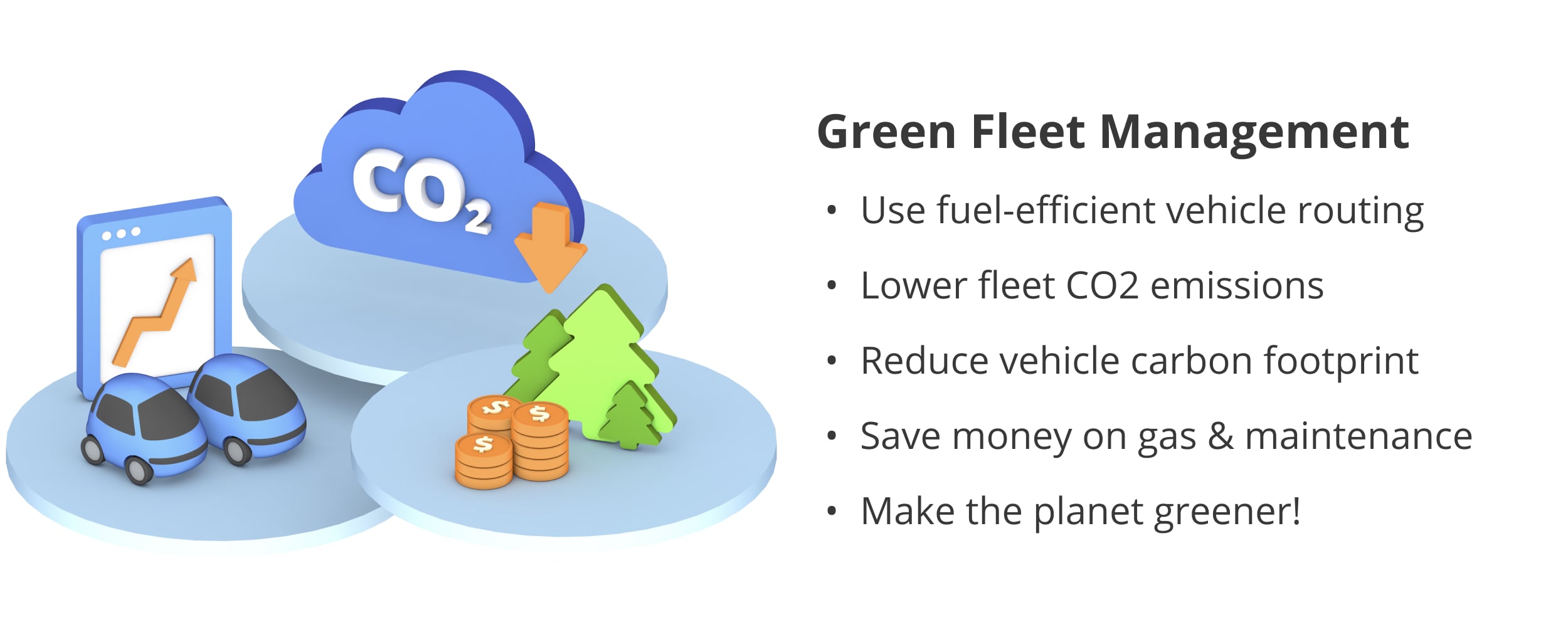
Sustainable Fleet Management with Electric Vehicles
According to a recent article by InsideEVs, one in 40 vehicles registered in 2024 was an electric vehicle. This means that the EV market share has almost doubled this year. Consequently, if the growth in zero-emission vehicle adoption continues, the transportation sector will drive down CO2 emissions while also managing to reduce the cost per mile, minimize fleet maintenance expenses, boost fleet performance and efficiency, and more!
On the same note, you can learn more about the benefits of having an electric fleet by reading our article on Telematics for Electric Vehicles.
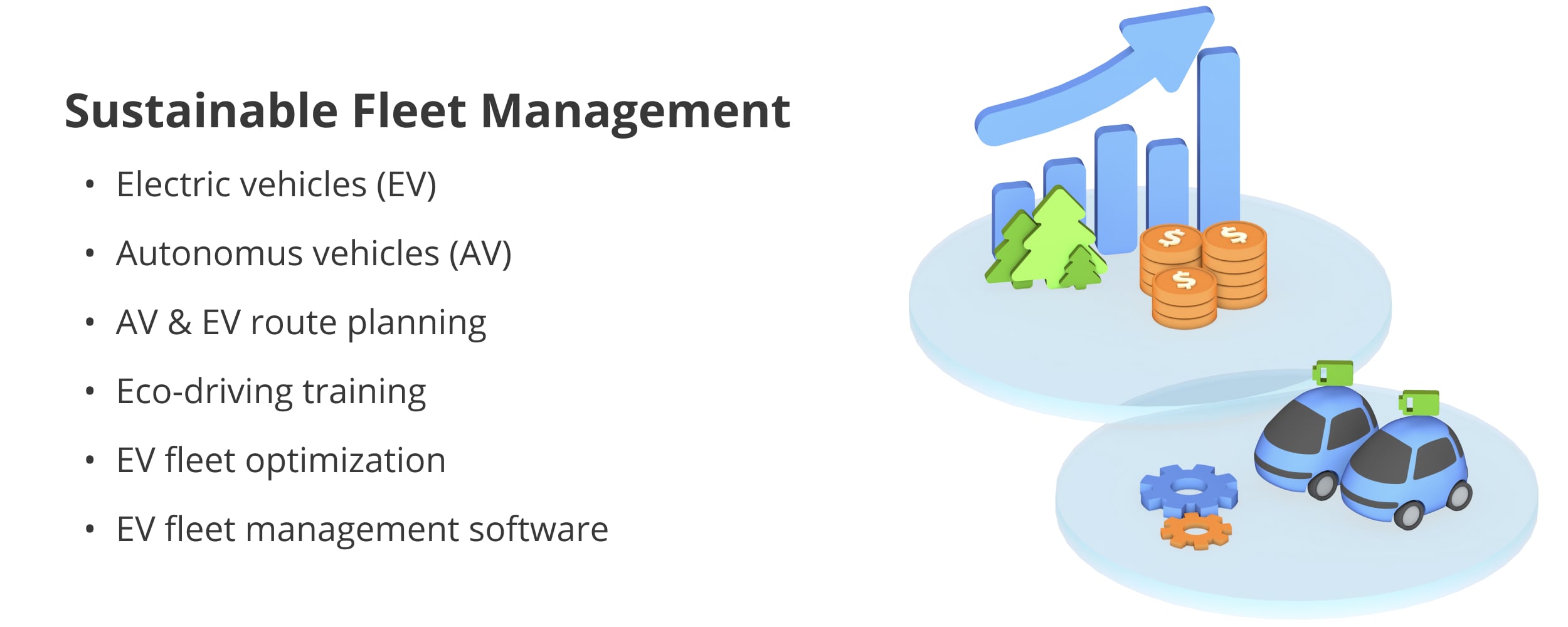
Best Practices for Fleet Administrators
Vehicle management and route optimization go hand in hand and are often interdependent. In fact, route optimization is essential for efficient vehicle management since it enables managers to reach their main objectives – cost savings, improved driver productivity, and business growth. Here are the best practices for fleet vehicle management and route optimization:
- Create optimally-sized routes and dispatch them equally among your drivers
- Avoid undesirable turns when creating your routes to minimize accident risks
- Track your fleet resources in near real-time to identify fraudulent or dangerous driving behaviors
- Store and analyze data on vehicle location, fuel consumption, driver productivity, vehicle maintenance metrics, and other relevant fleet-related aspects
- Keep an eye on road restrictions and legislation to stay compliant and avoid fines
- Implement a delivery route planner or business route dispatch software
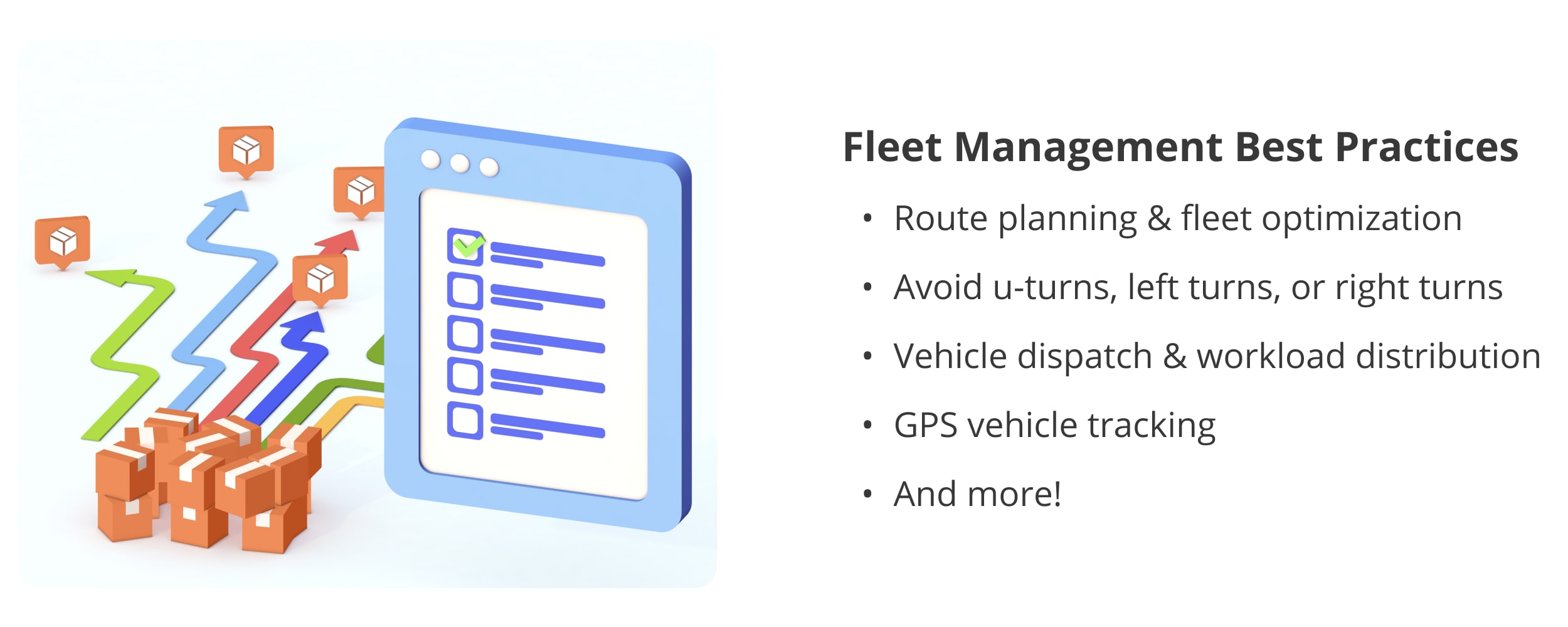
Fleet Vehicle Management Case Studies and Success Stories
— A Success Story is Worth a Thousand Words!
There is nothing like a business success story or a real-life story to help you learn more about a company and the product they offer. Below, you can find a few fleet vehicle management success stories from our customers where they tell how Route4Me helped them improve their route optimization and fleet management process.
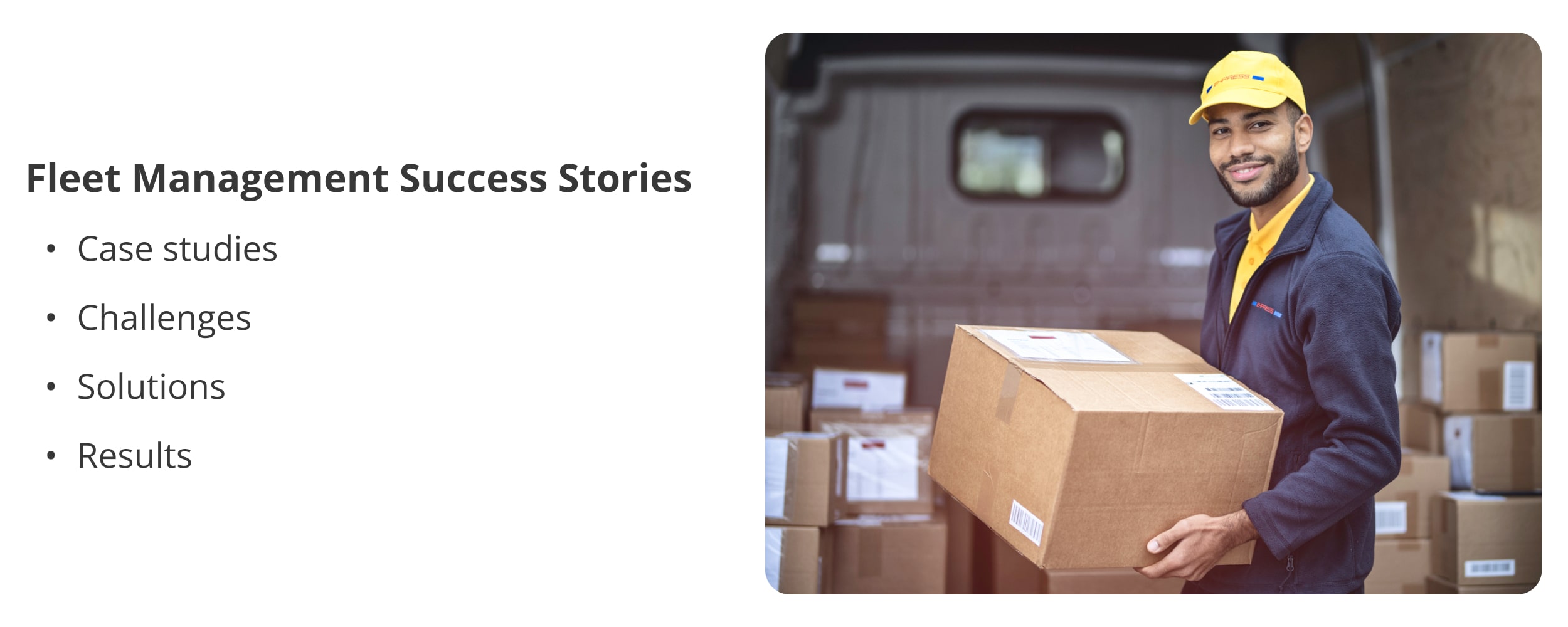
No Vehicle Administration Experience = Half a Million Pounds of Food Delivered – How?
— “We have been able to deliver almost a half a million pounds of food since the beginning of our project to some of the most vulnerable members of our community.”
The Opportunity Council is a non-profit organization that helps homeless and low-income families and individuals. During the pandemic, their distribution territory expanded overnight. So, some of their biggest challenges were the lack of route optimization knowledge and no experience in fleet administration. Accordingly, they had to coordinate multiple volunteer vehicles with different load carrying capacities in order to reach every person in need as fast as possible.
As a result, Opportunity Council managed to coordinate multiple vehicles and volunteers without any professional vehicle management experience. Specifically, the company managed to distribute stops among all available volunteer cars accounting for their capacity and parameters, and send each vehicle on the shortest and fastest route.
— “We are able to limit the pieces, which is critical for volunteers who can only fit a limited number of boxes in their cars.”
Additionally, you can read more of Route4Me’s vehicle management case studies and last mile success stories:
- ACORx Pharmacy’s fleet coordinators make more prescription deliveries by better coordinating and managing their fleet.
- ENYP Charity increases deliveries by 357% with efficient route optimization, vehicle management, and driver coordination.
The Best Software for Small, Medium, and Large Fleets in 2024
Vehicle management software is vital for today’s logistics managers as it automates processes that are crucial for business growth. Furthermore, the ideal fleet administration software solution should have the following capabilities, features, and applications:
- Features and capabilities tailored to your industry and unique business needs
- Reliable reporting tools that help you interpret your data to improve decision-making
- GPS tracking that enables you to supervise your fleet resources
- Delivery route planner or route optimization features that streamline your route planning process
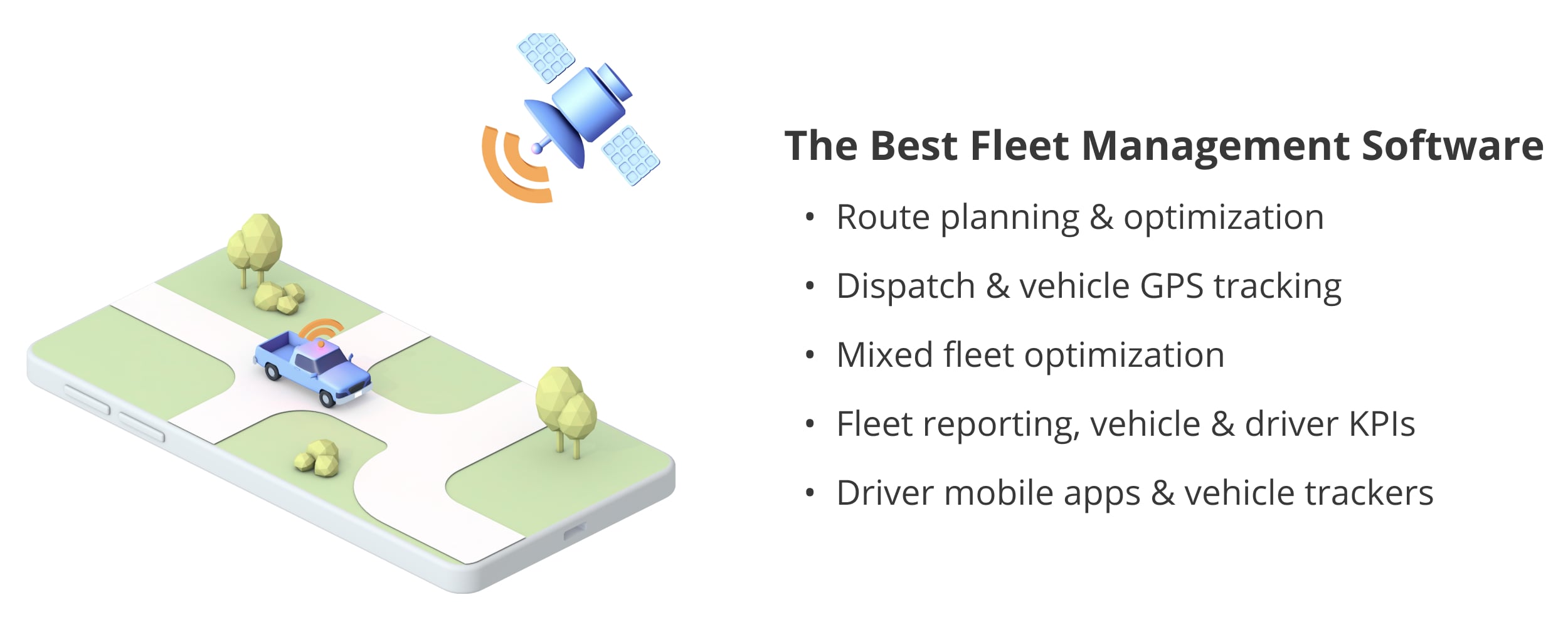
The Best Fleet Administration Software Solutions in 2024
Below, you will find a list of the most popular fleet management software solutions available on the market in 2024. However, this list is not intended to rank any of the presented fleet optimization solutions. Therefore, the software solutions are not placed in a particular order. So, here are 5 of the most well-rounded fleet management solutions out there:
Route4Me Fleet Management & Vehicle Route Planning Software
Route4Me’s easiest route planning software provides multiple tools for successfully managing fleets of any size or type. Namely, with Route4Me, you can plan and optimize routes for mixed fleets as well as uniform fleets. Moreover, Route4Me’s route optimization software features multiple vehicle management tools that give you the ability to set vehicle availability statuses, schedule service appointments, dispatch routes to the right vehicles, pair pickup and deliveries within the same routes, track fuel consumption, and much more. Additionally, with Route4Me’s fleet management KPI dashboard, you get a detailed overview of your driver productivity and vehicle profitability through easy-to-understand graphs, reports, and analytics.
Odoo Fleet Software
Odoo’s fleet software offers users the possibility to manage fleet assets through a user-friendly fleet app. Furthermore, the Odoo app features tools for contract management, such as vehicle leasing, as well as insurance tracking. At the same time, with Odoo’s fleet app, you can schedule vehicle maintenance and log vehicle fuel consumption.
Verizon Connect Fleet Administration Software and Solutions
Verizon Connect is a more advanced fleet management software. In detail, Verizon offers asset tracking, field service management, and other similar fleet management tools. Moreover, Verizon can help users track drivers and fleet vehicles in real time. Consequently, Verizon enables fleet admins to easily identify speeding, idling and harsh driving. Furthermore, Verizon claims to help in reducing fleet expenses and vehicle maintenance costs as well as minimizing fuel consumption. Also, the Verizon fleet optimization solution can improve vehicle dispatch, routing, and fleet visibility.
Track-POD Fleet and Route Optimization Software
Track-POD is a complex fleet administration solution with multiple features. For example, Track-POD offers route planning, route optimization, GPS tracking, electronic proof of delivery, and more. Furthermore, Track-POD’s fleet management solution aims to help users lower fleet expenses as well as get the most of their fleet capacity and staff.
Samsara GPS Fleet Tracking and Fleet Telematics Solutions
Samsara Fleet Telematics is an all-in-one fleet tracking and vehicle administration platform. Moreover, Samsara’s solutions feature capabilities such as live GPS tracking, reporting and analytics, dispatch management, accurate ETAs, and a lot more. Furthermore, Samsara also offers integrated dash cams and provides the users with the ability to enable automatic alerts for idling and speeding. Consequently, Smasara’s GPS fleet tracking software can help businesses better protect drivers and fleet assets.
Free Fleet Management Software Trial
Do you want to make your fleet more efficient?
Route4Me offers new users the possibility to sign up for a one-week free vehicle management software trial. Thus, you can optimize your fleet processes for 7 days without spending a single dollar. Moreover, you don’t even need a credit card to sign up for the free trial.
So, you have nothing to lose! On the contrary, with Route4Me, you can:
- Increase your logistics processes’ cost-effectiveness by 300%
- Leverage up to 30% savings by optimizing routes and tracking drivers
- Reduce your route planning time from hours to 60 seconds
- Decrease drive time by up to 35%
- And more!
Claim your Free Fleet Management Software Trial today!
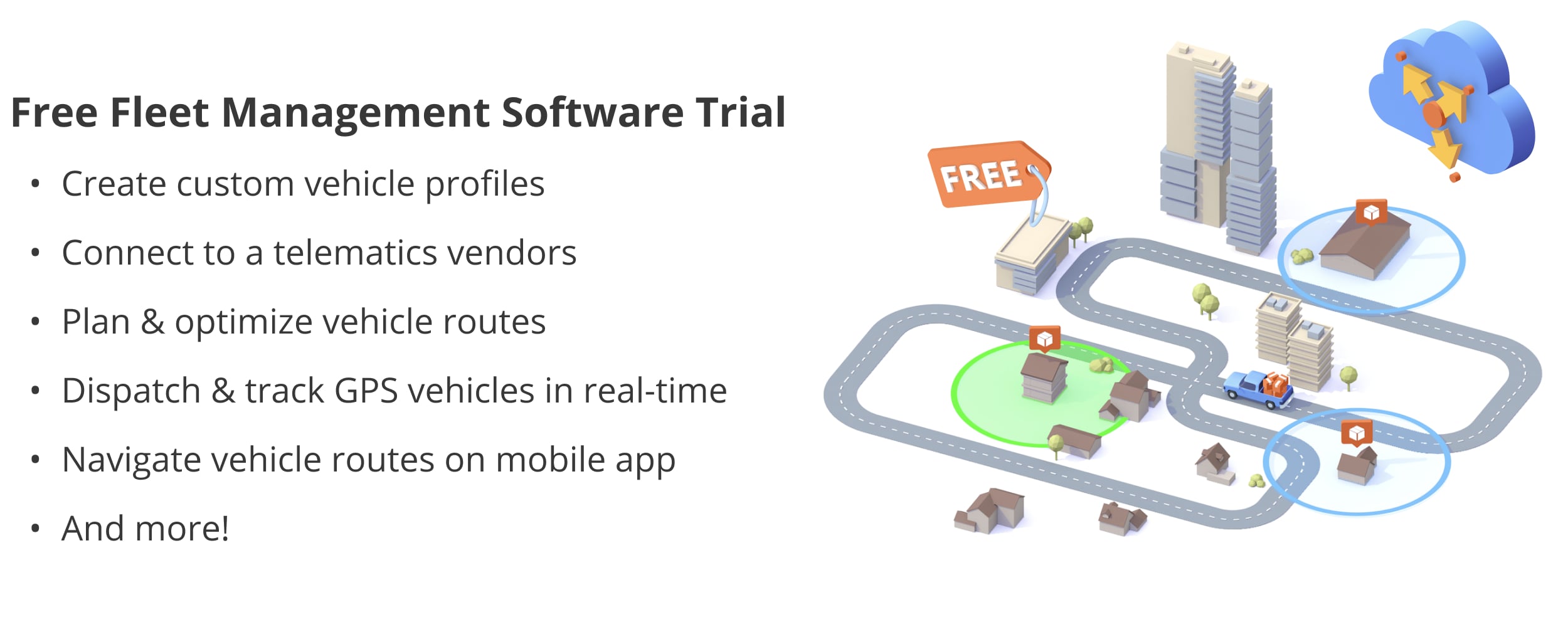
All the trademarks, logos, and brand names on this page are for identification purposes only. We do not endorse these trademarks, logos, and brand names. All the trademarks, logos, and brand names are the property of their respective owners. If any of the trademarks, logos, and brand names are your property or the property of your company, and you would like us to remove them from our website, please contact us at [email protected] to submit your request.
Last Updated:
